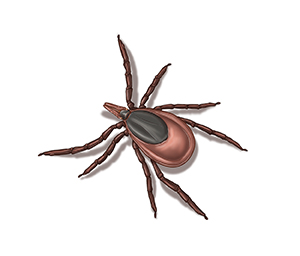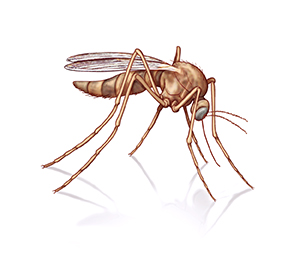Types of Arbovirus Encephalitis
What is encephalitis?
Encephalitis is an inflammation of the brain. It is often caused by a viral infection. The arboviruses cause encephalitis. They are passed on to people and animals by insects.
In the U.S., several types of arboviruses can cause encephalitis, such as:
Each of these viruses tends to be more common in certain parts of the U.S. Most of them are passed to humans by mosquitoes. Others may be spread by ticks.
Travelers abroad are most at risk for Japanese encephalitis and tick-borne encephalitis.
Japanese encephalitis comes from mosquitoes. It occurs mainly in:
-
China, Japan, and Korea
-
Eastern Russia
It also occurs less often in Republic of China (Taiwan), Singapore, and Hong Kong. In all of these areas, Japanese encephalitis is mainly a rural disease.
Tick-borne encephalitis is a viral infection of the central nervous system. It is passed on by bites of certain ticks.
People can be infected by the bite of infected Ixodes ricinus ticks. This often happens in people who visit or work in forests, fields, or pastures. You can also get it by consuming unpasteurized dairy products from infected cows, goats, or sheep.
For the most part, very few people who are infected by a mosquito or tick bite develop an illness. Most people who are infected get only mild or no symptoms. But in people who develop encephalitis, the results are serious. They may have:
-
Fever
-
Stiff neck
-
Sleepiness
-
Personality changes
Seizures and coma can occur in the most severe cases.
The risk of getting encephalitis is greatest from April through August. This is when ticks and mosquitoes are most active.
 |
| Tick. |
 |
| Mosquito. |
What causes arbovirus encephalitis?
The arboviruses that cause encephalitis are passed on to people and animals by insects. In rural areas, arboviruses that are carried by mosquitoes or ticks are the most common cause of arboviral infection. The infection is often mild. But it can worsen to encephalitis.
What are the symptoms of arbovirus encephalitis?
Most infections do not cause symptoms. When they do cause symptoms, they may be like the flu. Symptoms may start slowly. Or they may be sudden. The infection may get worse and become encephalitis. Encephalitis may result in death or cause lasting nervous system problems. Fortunately, only a small number of infected people develop encephalitis. These are the most common symptoms of encephalitis caused by arboviruses:
These symptoms may look like other health problems. Always see your healthcare provider for a diagnosis.
How is arbovirus encephalitis diagnosed?
To diagnose encephalitis, a healthcare provider will ask about your past health and symptoms. They will also do a physical exam. You may also need:
-
A CT scan or MRI to look for swelling in the brain
-
Spinal tap (lumbar puncture) to look for signs of infection in the spinal fluid
-
Blood tests and tests on the spinal fluid to tell which virus is causing the inflammation
How is arbovirus encephalitis treated?
Because this is a viral disease, antibiotics will not help. There are no effective antiviral medicines at this time. There is no specific treatment for encephalitis. The main goal is to ease symptoms and keep the person's breathing and circulation working well while the infection runs its course. Your healthcare provider will decide on the best treatment for you based on:
-
How old you are
-
Your overall health and past health
-
How sick you are
-
How well you can handle specific medicines, procedures, or therapies
-
How long your condition is expected to last
-
Your opinion or preference
Can arbovirus encephalitis be prevented?
A vaccine for Japanese encephalitis is currently available in the U.S. through most travelers' clinics. The CDC recommends the vaccine only for people who will travel in rural areas for 4 weeks or more. It is also advised where there is a known outbreak of Japanese encephalitis.
As a traveler, take steps to prevent insect bites, such as:
-
Limit how much time you spend outdoors during the cooler hours at dusk and dawn. This is when mosquitoes that pass on the disease feed.
-
Wear mosquito repellents with DEET as an active ingredient.
-
Stay in air-conditioned or well-screened rooms.
If you are traveling to rural areas, bring a portable bed net. Use permethrin, a mosquito repellent, on both the bed net and clothing.
Another way to prevent encephalitis is with mosquito control. In many emergency cases, the best method is with aerial spraying. Many states may use aerial spraying to control mosquitoes. They can also spray in areas where the virus is active. After spending time in outdoor places known to have ticks, check yourself for ticks and remove them as quickly as possible. Check your pets (especially dogs) as well.
To protect yourself against tick-borne encephalitis, follow these recommendations:
-
Stay away from tick-infested areas.
-
Wear clothing that will help you prevent being bitten.
-
Use repellents with DEET in them. These can be put directly on skin.
-
Use permethrin on clothing and camping gear.
-
Don't drink or eat unpasteurized dairy products.
When should I call my healthcare provider?
Call your healthcare provider if you have these symptoms:
Key points on arbovirus encephalitis
-
Encephalitis is an inflammation of the brain. It is often caused by a viral infection. Arboviruses can cause encephalitis.
-
Arboviruses are passed on to people and animals by insects. In rural areas, mosquitoes and ticks are the most common carriers.
-
The viral infection is often mild. But it can progress to encephalitis.
-
There is no treatment for encephalitis. Treatment helps relieve symptoms while the virus runs its course.
Next steps
Tips to help you get the most from a visit to your healthcare provider:
-
Know the reason for your visit and what you want to happen.
-
Before your visit, write down questions you want answered.
-
Bring someone with you to help you ask questions and remember what your provider tells you.
-
At the visit, write down the name of a new diagnosis and any new medicines, treatments, or tests. Also write down any new instructions your provider gives you.
-
Know why a new medicine or treatment is prescribed and how it will help you. Also know what the side effects are.
-
Ask if your condition can be treated in other ways.
-
Know why a test or procedure is recommended and what the results could mean.
-
Know what to expect if you do not take the medicine or have the test or procedure.
-
If you have a follow-up appointment, write down the date, time, and purpose for that visit.
-
Know how you can contact your healthcare provider if you have questions, especially after office hours or on weekends.